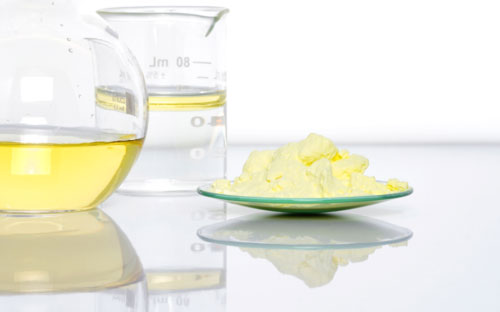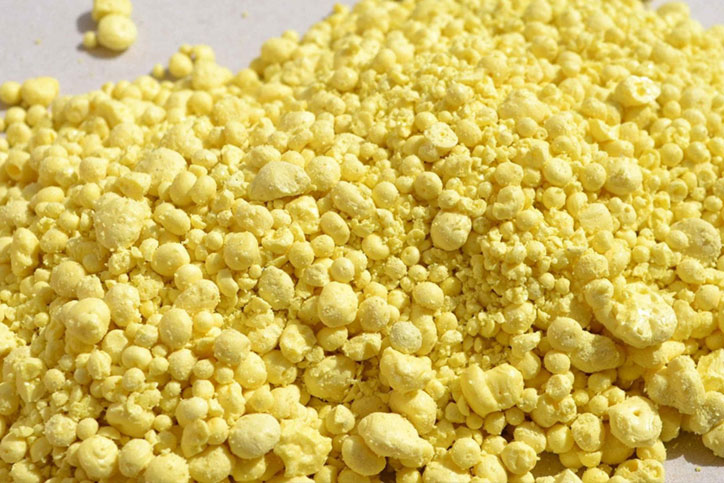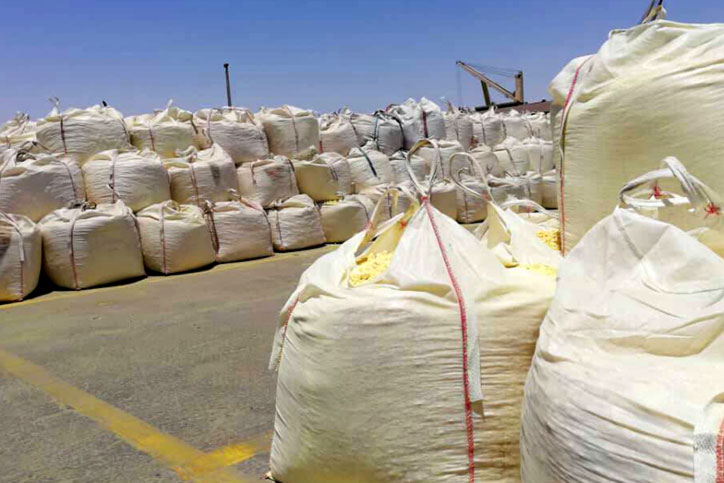Sulphur – CAS#: 7704-34-9
Bulk Order
Sulfur or sulphur is the chemical element that has the symbol S and atomic number 16. It is an abundant, tasteless, multivalent non-metal. Sulfur, in its native form, is a yellow crystalline solid. In nature, it can be found as the pure element or as sulfide and sulfate minerals. It is an essential element for life and is found in two amino acids, cysteine and methionine. Its commercial uses are primarily in fertilizers, but it is also widely used in gunpowder, matches, insecticides and fungicides.
Is a bright yellow, odorless, and tasteless solid substance that is non-metallic in nature. It is insoluble in water, but soluble in carbon disulphide and other organic solvents. Sulphur has a melting point of 115.21 degrees Celsius and a boiling point of 444.6 degrees Celsius. When heated, sulphur can undergo a phase change from a solid to a liquid and then to a gas.
ISO 9001, ISO 14001, ISO 13485, and ISO 45001
- Lump Sulphur
- Liquid/Molten Sulphur
- Slated Sulphur
- Molded Sulphur
- Prilled Sulphur
- Pastillated Sulphur
- Granulated Sulphur
| Physical Form | Lumps & Powder |
| Apperance | Bright Yellow |
| Purity on Dry Basis, wt% | 99.80% Min |
| Moisture, wt% | 0.02% Max |
| Ash Content, wt% | 0.015% Max |
| Organic Solid Matter, wt% | 0.01% Max |
| Acid Content, wt% | 0.0001% Max |
| Mechanical Impurities(Paper, Wood, Sand Etc), wt% | 0.01% Max |
- Jumbo Bag
- ISO Containers
- Drums
- Intermediate Bulk Containers (IBCs)
What is the Sulphur?
Sulphur (S) is a crucial nutrient for plant growth and development, as it provides direct nutritional value and enhances soil productivity to improve the efficiency of other key nutrients like nitrogen and phosphorus. This results in increased crop yields and overall plant health.
In addition to its role in agriculture, sulphur is also a primary source for the production of sulphuric acid, the most widely used chemical in the world. Sulphuric acid is predominantly used in the fertilizer industry for the production of phosphates, nitrogen, potassium, and sulphate fertilizers. It is also used in the metals industry for mineral ore leaching, particularly in the production of copper, nickel, and zinc.

Although sulphur is naturally present in the environment and was mined for many years, the majority of sulphur used today is produced as a by-product from oil refining and gas processing plants. This ensures a steady supply of sulphur for various industrial and agricultural applications while minimizing the environmental impact of mining.
What is Sulphur Used For?
Diethylene glycol (DEG) is a versatile chemical with a wide range of industrial and consumer applications. Here are some of the most common uses of DEG:
It is an essential nutrient for plant growth and is an important component of many fertilizers, particularly sulphate fertilizers. It helps to improve soil productivity, increase crop yields, and enhance the efficiency of other key nutrients like nitrogen and phosphorus.
Sulphur is a primary source for the production of sulphuric acid, which is the most widely used chemical in the world. Sulphuric acid is used in the production of various chemicals, such as fertilizers, detergents, and industrial acids.
Sulphur is a common impurity in crude oil and natural gas. It is removed during refining and is used to produce sulphuric acid or other chemicals. Sulphur is also used in the production of gasoline and other fuels to reduce emissions of harmful pollutants.
Sulphur is used in the production of various pharmaceuticals, such as antibiotics, anti-inflammatory drugs, and antifungal agents.
Sulphur is used as a preservative in the food industry to prevent the growth of bacteria and other microorganisms. It is also used in the production of certain food products, such as wine and dried fruits.
Sulphur Industry Used
This substance is used in the production of the following materials:
- Agriculture and fertilizer industry
- Chemical industry
- Petroleum industry
- Rubber industry
- Food industry
- Pharmaceutical industry.
Sulphur Safety Procedures
Sulphur is a chemical that can be hazardous if not handled or used properly. Here are some important safety warnings to keep in mind:
- Sulphur can be harmful if ingested, inhaled, or absorbed through the skin. Always wear appropriate personal protective equipment (PPE) when working with sulphur, including chemical-resistant gloves, safety glasses, and a lab coat or protective clothing.
- Sulphur should be handled with care to avoid spills or splashes. Use proper lifting techniques and avoid dropping or jostling containers of sulphur.
- Sulphur should be stored in a secure, designated area away from other chemicals or materials that could react with it. It should be stored in a cool, dry, well-ventilated area and kept away from sources of heat or ignition.
- Sulphur should only be used in well-ventilated areas to prevent the buildup of toxic fumes or vapors.
- In case of skin contact, immediately wash affected area with soap and water. In case of eye contact, rinse with plenty of water for several minutes and seek medical attention if irritation persists.
- In case of ingestion or inhalation, seek medical attention immediately and provide the medical personnel with the Safety Data Sheet (SDS) for sulphur.


